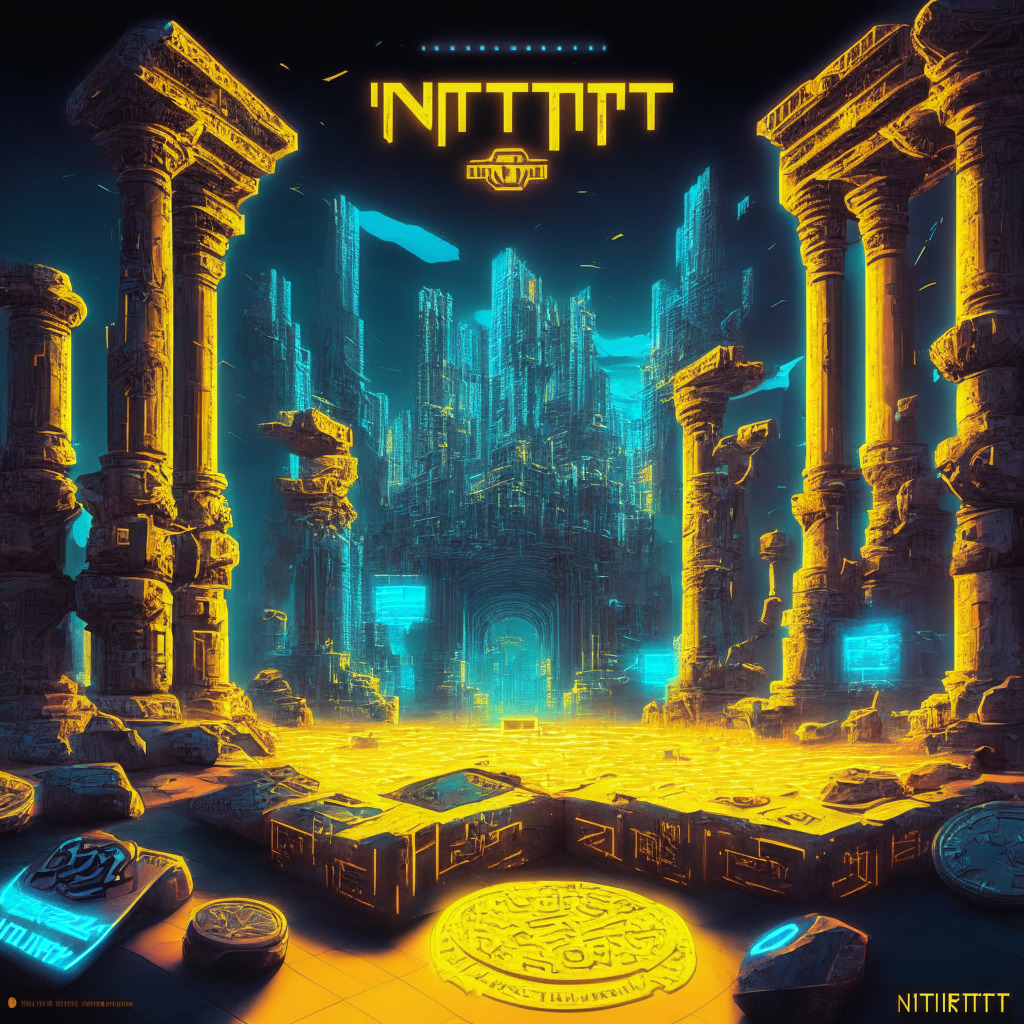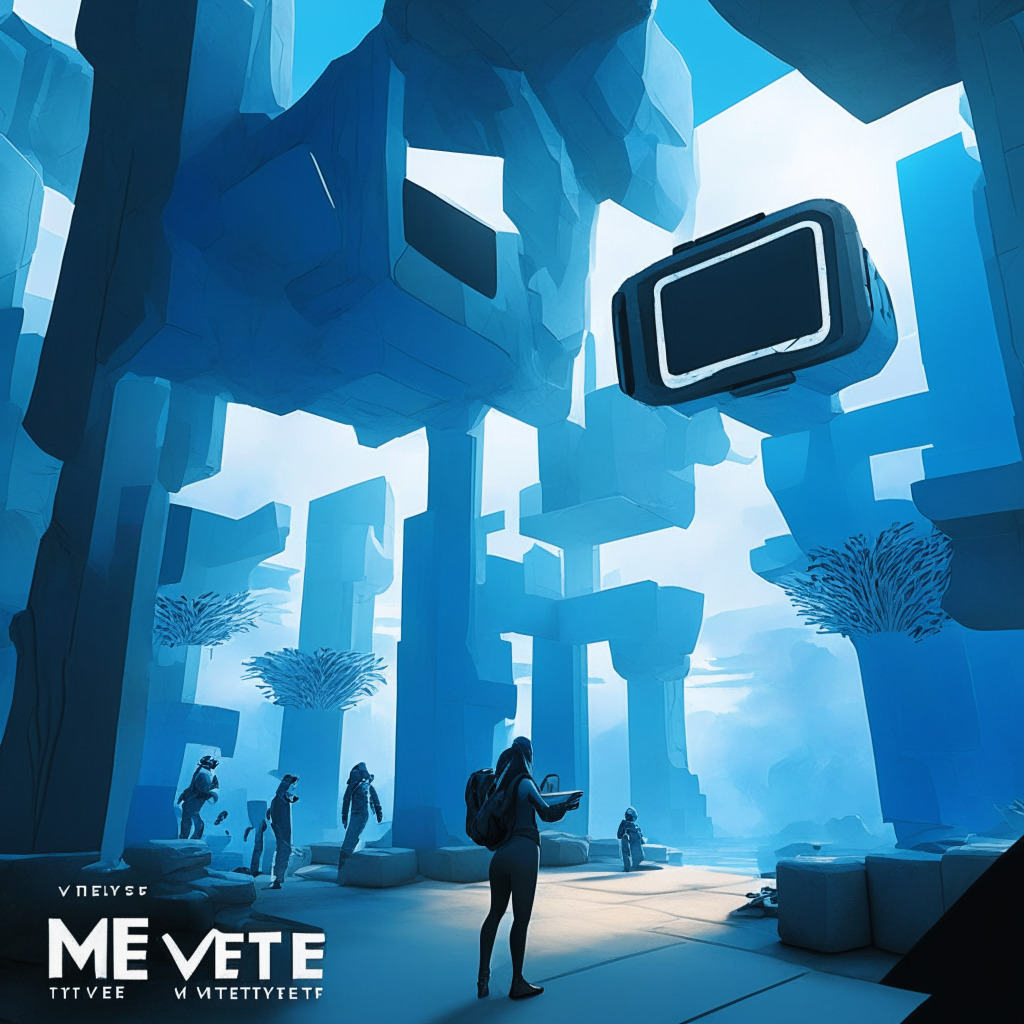Tesla CEO Elon Musk and Meta CEO Mark Zuckerberg prepare for a potential cage fight following a heated online exchange about Meta’s decentralized social network plans. Amidst the excitement, it’s vital for crypto enthusiasts and investors to remain focused on market research and informed decision-making.
Search Results for: Mark Zuckerberg
PayPal and the NFT Market: Innovative Strides or Potential Disaster?
“PayPal has lodged an application for an NFT marketplace patent, hinting at a system facilitating the transfer and purchase of NFTs. However, the volatility of NFTs and regulatory gray areas surrounding digital assets pose potential risks and challenges.”
Zuckerberg’s Bet on AI for Meta’s Metaverse Dominance: Visionary Leap or Blind Hope?
Meta’s CEO, Mark Zuckerberg, highlighted the crucial role of AI in the development of the metaverse during a recent interview. By leveraging technology that integrates VR/AR and AI, Zuckerberg aims to establish Meta’s dominance in the 3D immersive metaverse. Despite financial setbacks, he remains committed to the metaverse vision, betting on Llama 2’s technology integration with Meta AI as their unique competitive edge.
Takashi Murakami’s NFT Adventure: Unpredictable Markets yet an Unwavering Faith in Digital Art’s Future
“Japanese artist Takashi Murakami’s introduction into the cryptoverse with Non-Fungible Tokens (NFTs) was impacted by the 2022 crypto collapse. Despite this, his belief in digital art remains strong, evident in his exhibition at San Francisco’s Asian Art Museum.”
Zuckerberg’s Metaverse: An Undervalued Investment or an Overambitious Gamble?
Mark Zuckerberg’s metaverse initiative cost Facebook and Meta an estimated $21 billion, with tangible outcomes far less than invested. Despite only selling around 20 million units of the Quest VR headset and attracting a mere 200,000 users to Meta’s flagship VR experience, Horizon Worlds, Zuckerberg remains unfazed. Critics argue this detracts from their original advertising business while questioning the financial feasibility of the metaverse project.
Clash of Tech Titans: Musk Versus Zuckerberg in Social Media Supremacy Battle
“The clash between Elon Musk and Mark Zuckerberg pertains to claims of intellectual property rights infringement regarding Meta’s release of Threads, a replica of Twitter’s platform. This controversy underscores the importance of balancing innovation and protecting the intellectual property rights within the tech sector, while maintaining ethical practices amidst competition. This serves as a reminder that the path to technological supremacy should be paved with fair practices.”
Sotheby’s NFT Marketplace and Meta’s Struggles: Blockchain Evolution or Growing Pains?
Sotheby’s auction house launched an on-chain NFT marketplace featuring unique artists, while marketplace Blur introduced Blend, a perpetual NFT lending protocol. Neobank Cogni introduced soulbound NFTs for wallet holders’ KYC information, showing rapid progress and adoption of NFTs in various sectors despite challenges like market imbalances and high-stake project losses.
Meta AI vs OpenAI’s ChatGPT: The Dawn of a New Social Media Interaction Era and Its Ramifications
“Mark Zuckerberg sets to launch Meta AI, interacting across platforms like Instagram and Facebook. Aiming to outdo OpenAI’s ChatGPT, Meta tailors AI products to distinct use cases and entertainment, scheduled to release to selected U.S users and integrate with upcoming smart glasses.”
Decoding the AI Regulation Puzzle: Tech Titans Vs. Lawmakers on Navigating AI’s Future
“In a closed-door meeting, tech leaders including Elon Musk and Mark Zuckerberg stressed the urgent need for AI regulation. The discussions revolved around AI’s potential dangers and benefits, with skepticism about unregulated technology’s negative impact, yet belief in AI’s groundbreaking potential with careful monitoring.”
Unraveling the Threads: Meta’s Crypto-Oriented Pursuits and the Tussle over Decentralization
“Mark Zuckerberg has introduced Threads, Meta’s new app, with protocols drawn from the open-source Mastodon system. Despite its decentralized backend, Meta could still gather full spectrum user data, reviving concerns about privacy. Its use of decentralization might urge acceptance of such protocols, but user interest stays uncertain.”
Meta’s Controversial Release of LLaMA AI: Examining Security Risks and Ethical Implications
U.S. Senators Blumenthal and Hawley criticize Meta’s “unrestrained and permissive” release of AI model LLaMA, fearing its potential misuse in cybercrime and harmful content generation. They question Mark Zuckerberg about risk assessments and mitigation efforts prior to LLaMA’s release, emphasizing the importance of responsible AI development and oversight.
LinkedIn’s AI-Assistants Join the Recruitment Game: Revolutionary or Risky?
LinkedIn is incorporating AI into its operations to help recruiters and learners, despite skepticism about loss of human touch in such processes. Advocates argue that AI provides time-saving benefits and tailors content, with 74% LinkedIn users noting time savings after the introduction of AI-assisted messages when recruiting. The ongoing debate about AI’s pros and cons continues, but its growing incorporation into various industries is undeniable.
Brazil’s AI Regulation Journey: Balancing Technology Growth and Human Rights Protection
“Brazil has initiated a procedure to examine, analyze and possibly amend a proposed bill concerning AI regulation. The Bill No. 2338, aimed at managing the use of AI and safeguarding human rights, is now set to undergo close scrutiny by the Senate Commission over the next 120 days. The goal is striking a balance between upholding human rights and fostering AI technological developments.”
Metaverse Losses and Blockchain Gaming: Navigating the Unchartered Waters of Cryptocurrency Integration
“Facebook’s Meta invests heavily in the metaverse despite losses, while in the blockchain gaming space, Alchemy: Battle for Ankhos integrates cryptocurrencies and AI. Meanwhile, Ultra, a crypto gaming startup, builds a tournament platform with its blockchain network for the thriving eSports industry.”
Reinvigorating Meta’s Metaverse: A Strategy Swing Towards Mobile Gaming and AI Innovation
Meta’s new strategy for its Horizon Worlds platform involves nurturing an in-house VR game studio, Ouro Interactive, to create pioneering first-party titles. Aiming for broader appeal, Meta plans to introduce Horizon Worlds to mobile gamers globally, transforming the platform from VR-exclusive to VR-predominant. This move targets users without VR headsets and enables cross-platform play. Despite recent financial losses, the company remains optimistic about AI and metaverse as focal priorities.
Navigating the Crypto Storm: Rising Institutional Involvement, Legal Scuffles, and Metaverse Aspirations
The CME’s regulated bitcoin and ether futures experienced heightened involvement from large traders in Q2 amid financial market volatility, indicating growing trust in such platforms. However, the credibility of key crypto market players is under the scanner as FTX founder Sam Bankman-Fried faces allegations from the DOJ of witness interference. Meanwhile, despite financial struggles, Meta remains committed to its metaverse vision.
Journey into the Metaverse: Meta’s High-Stakes Gamble on a Future Forward Approach
In 2022, Meta reported a loss of $13.7 billion for its Facebook Reality Labs division, the team leading metaverse development. Despite financial challenges, Meta anticipates a brighter future, citing key initiatives such as augmented reality, neural interfaces and social platforms.
Shifting Social Media Power: The Failure of Twitter and Threads, and the Missed Blockchain Opportunity
“Entities operating blockchain-based social media missed a chance to collaborate during the mass transition from Twitter to Threads. The data portability and management issues could be alleviated using Decentralized ID, giving users control. Sadly, major platforms thrive on data sales, making this currently infeasible.”
AI Content Cannibalism: The Curse of Model Autophagy Disorder and Hope Beyond
The phenomenon of ‘Content Cannibalism’ in Artificial Intelligence is dampening its credibility, leading to a decay in output quality. Sam Altman of OpenAI suggests maintaining quality by prioritizing human content. High-profile AIs like Bill Gates argue for a measured approach, managing potential AI risks.
Navigating Metaverse Regulation: EU’s Plan for Balance, Openness and Growth
“The EU is considering regulation to empower future metaverse innovation, insisting on international governance and interoperability. The plan may include creation of decentralized autonomous organizations to oversee metaverse activities, protection of personal data, and the launching of a Virtual World ToolBox in Q1 2024.”
Generative AI Impact: Accelerated Automation and Economic Growth vs. Ethical Concerns
A McKinsey & Co. report predicts that by 2045, generative AI may fully automate 50% of today’s work activities, including decision-making and management, with 75% value creation in customer service, marketing, software engineering, and R&D. Adoption rates will differ globally and raise concerns over fake news, information manipulation, and ethical issues.
Exploring the Metaverse Gold Rush: Opportunities, Risks, and Investment Strategies
The metaverse industry is potentially worth trillions, with investments pouring into blockchain-based projects. However, market cap losses and speculative transactions warrant caution among investors. Despite challenges, tech giants like Microsoft, Apple, Nvidia, and Qualcomm continue developing metaverse strategies, indicating a promising future.
Meta’s LLaMA Drama: Senators Scrutinize Leak and Potential Misuse of AI Model
U.S senators raise concerns over Meta’s large language model (LLaMA) potential misuse in harmful activities, questioning Meta’s risk assessment and preventive steps. LLaMA’s leak increased accessibility to high-quality AI models, prompting scrutiny on the balance between innovation and risk.
Apple Vision Pro: Spatial Computing Revolution vs Metaverse Hype
Apple’s Vision Pro, a mixed-reality headset, is set to launch in early 2024. Focusing on “spatial computing” rather than AR, VR, or metaverse buzzwords, this standalone device offers advanced personal electronics for work, gaming, and communication. However, anticipation for the product couldn’t prevent a 10% decrease in metaverse tokens’ market cap following an SEC lawsuit against Binance.
Meta’s AI Pursuits: Boon or Bane for the Metaverse Revolution?
Facebook’s rebranding to Meta Platforms Inc signals a leap into the metaverse, but recent AI-focused activities have stirred speculation. Despite setbacks, Meta emphasizes AI’s importance in metaverse development, enabling boundary-pushing products and greater accessibility for users.
Metaverse Debate: Tech World Divided Between Potential and Abandonment
This article debates the metaverse’s future, as some claim it has run its course and been abandoned by businesses, while others like Tim Sweeney argue that there are still 600 million monthly active users across platforms, and tech giants continue investing in its potential.
The Great AI Debate: Balancing Innovation, Risks, and Collaborative Safeguards
The meeting between U.S. Vice President Kamala Harris, President Biden’s advisors, and AI industry CEOs discussed potential risks posed by AI technology, emphasizing shared responsibility between governments and companies in risk mitigation. Topics covered transparency, safety evaluation, and protection from malicious actors. The Biden Administration allocated $140 million to National AI Research Institutes, and White House plans to release a draft policy on government usage of AI.
Meta’s New Debt Shelf Offerings: Impact on Investors and Connection to AI Development
Meta Platforms Inc., the parent company of Facebook, Instagram, and WhatsApp, has recently submitted a […]
Blockchain’s Future Potential: Trust and Innovation vs. Scalability and Environmental Concerns
Blockchain technology has the potential to disrupt traditional markets and increase trust and transparency with decentralized, secure transactions. Despite challenges like scalability, environmental impact, and regulatory obstacles, its implementation across various industries shows promise for a transformative future.




























